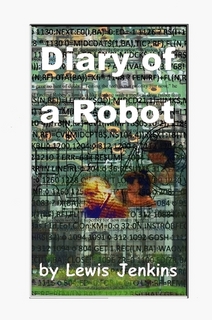S. Dorman reviews Diary of a Robot by Lewis Jenkins
The oddest thing about Lewis Jenkins's first novel, Diary of a Robot, is the robot's prime directive. That the "Doc," its inventor, succeeds in his artificially intelligent creation is shown in Jenkins' premise — or conceit, if you will — that the AI is the one telling us its own story. But, I have not yet revealed the weird — the robot's prime directive. In the robot's diary are respectful nods to I, Robot, Isaac Asimov's work, and touches of evident love for Patrick McGoohan's The Prisoner. You'll find history, science fiction, and mystery in this story.
Dr. Little's invention, the TM 2000—Robey (pronounced Row-bee)—is on its way to becoming a self-directed systems, software, and hardware testing machine. The "Doc" does not invent without the aid of his little company (TLC —The Little Company). In much of Jenkins' book Robey displays the learning process of an artificial intelligence. But the book does so much more, as regards the imaginative reading experience. What we want while reading science fiction is hardware, suspense, defined characters, situation, and the "what if" or BIG IDEA. This novel has that, and more — corporate espionage, bad news, abduction, impersonation, intimations of murder, and chess problems. But the real more is in TM 2000's process of testing, of learning, What's a human being?. Many questions are asked (by The Machine) and, as we watch it mature toward its full intellectual stature, many more possible answers are given (also by The Machine).
Have you ever heard of a computer program designed to test for truth? And why would financial backers invest in a testing machine with such a prime directive? Although to "do no harm" is an important directive suggested by Asimov, Dr. Maynard Little's team have encoded those specs and others—but secondarily.
Robey wants to determine the thoughts and intentions of the human heart. Its aim is incisive: Precision in reading the human intention in order to act toward its goal of perceiving the truth about each person. Intelligently, even heroically, Robey intends to achieve it. Being designed specifically for the task, nothing can stop it but a command to … stop?… What if the command to stop is not based on truth —?
Robey's heroism comes in when his maker, Doc Little, commands him to shut down. Not to turn itself off because Robey has disobeyed its directives, but because it has. From there on, The Doc gets his wish, and havoc results in the AI department of The Little Company.
Do you like exposition and introspection? This is the SF for you. If you read to escape, or for respite from, introspection, this book may not be for you. Yet, it's a fun and funny novel. The frequent SF take on AI, e.g. Clarke’s HAL, is often sinister, but this robot is different in being innocently tedious, or irritating, boring, obnoxious, office-disrupting; some kind of pain, depending on who is charging/spending time developing (in concert with Robey) its core directive. The reader has fun watching it "test" (read bedevil) the crew at TLC. However, we see that Robey is a servant and understands that it is a servant. Everyone is either Mr. or Ms., e.g. Mr. Guy and Ms. Marie. Robey is also, of course, the ultimate testing machine. This is, after all, how it makes money for The Little Company. There's an abundance of humor in this book, the kind I like. I won't give examples because the humor is always contextual. The kind that punctuates (or punctures) the silence of reading with small explosions of laughter.
A big theme, a BIG IDEA, in Robey's story is (metaphorically) the increasing influence of surveillance in our lives. C.S. Lewis has said about our human condition that the more we take precautions to be secure, the less secure we feel. But this Big Idea is also not present at first in Jenkins' story of Robey. Instead, as intelligent software and machines increase at TLC, themes of security and surveillance accelerate the Diary's narrative force, while underscoring C.S. Lewis's observation about our condition.
Diary of a Robot is not a review of my brother. It is a review of my brother's book.
Diary of a Robot on Lulu



